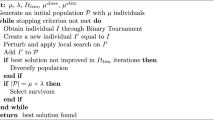Abstract
The coupled task scheduling problem aims to schedule a set of jobs, each with at least two tasks and there is an exact delay period between two consecutive tasks, on a set of machines to optimize a performance criterion. We study the problem of scheduling a set of coupled jobs to be processed on a single machine with the objective of minimizing the makespan, which is known to be strongly NP-hard. We obtain competitive lower bounds for the problem through different procedures, including solving 0-1 knapsack problems. We obtain an upper bound by applying a heuristic algorithm. We then propose a binary search heuristic algorithm for the coupled task scheduling problem. We perform extensive computational experiments and show that the proposed method is able to obtain quality solutions. The results also indicate that the proposed solution method outperforms the standard exact solver Gurobi.


Similar content being viewed by others
References
Ageev AA, Baburin AE (2007) Approximation algorithms for UET scheduling problems with exact delays. Op Res Lett 35(4):533–540
Azadeh A, Farahani MH, Torabzadeh S, Baghersad M (2014) Scheduling prioritized patients in emergency department laboratories. Comput Methods Progr Biomed 117(2):61–70
Békési J, Galambos G, Jung MN, Oswald M, Reinelt G (2014) A branch-and-bound algorithm for the coupled task problem. Math Methods Op Res 80(1):47–81
Brauner N, Finke G, Lehoux-Lebacque V, Potts C, Whitehead J (2009) Scheduling of coupled tasks and one-machine no-wait robotic cells. Comput Op Res 36(2):301–307
Carlier J, Néron E (2003) On linear lower bounds for the resource constrained project scheduling problem. Eur J Op Res 149(2):314–324
Condotta A, Shakhlevich N (2012) Scheduling coupled-operation jobs with exact time-lags. Discrete Appl Math 160(16):2370–2388
Condotta A, Shakhlevich N (2014) Scheduling patient appointments via multilevel template: a case study in chemotherapy. Op Res Health Care 3(3):129–144
Czyzyk J, Mesnier MP, Moré JJ (1998) The NEOS server. IEEE J Comput Sci Eng 5(3):68–75
França PM, Gendreau M, Laporte G, Müller FM (1995) The m-traveling salesman problem with minmax objective. Transp Sci 29(3):267–275
Graham R, Lawler E, Lenstra J, Kan AR (1979) Optimization and approximation in deterministic sequencing and scheduling: A survey. Ann Discrete Math 5:287–326
Grimes D, Hebrard E (2015) Solving variants of the job shop scheduling problem through con ictdirected search. INFORMS J Comput 27(2):268–284
Gurobi Optimization L (2018) Gurobi Optimizer Reference Manual
Khatami M, Salehipour A, Cheng T (2020) Coupled task scheduling with exact delays: literature review and models. Eur J Op Res 282(1):19–39
Lehoux-Lebacque V, Brauner N, Finke G (2015) Identical coupled task scheduling: polynomial complexity of the cyclic case. J Sched 18(6):631–644
Li H, Zhao H (2007) Scheduling coupled-tasks on a single machine. In: IEEE symposium on computational intelligence in scheduling, pp 137–142
Marinagi CC, Spyropoulos CD, Papatheodorou C, Kokkotos S (2000) Continual planning and scheduling for managing patient tests in hospital laboratories. Artif Intel Med 20(2):139–154
Martello S, Pisinger D, Toth P (1999) Dynamic programming and strong bounds for the 0–1 knapsack problem. Manag Sci 45(3):414–424
Orman A, Potts C (1997) On the complexity of coupled-task scheduling. Discrete Appl Math 72(1):141–154
Pérez E, Ntaimo L, Wilhelm WE, Bailey C, McCormack P (2011) Patient and resource scheduling of multi-step medical procedures in nuclear medicine. IIE Trans Healthc Syst Eng 1(3):168–184
Pérez E, Ntaimo L, Malavé CO, Bailey C, McCormack P (2013) Stochastic online appointment scheduling of multi-step sequential procedures in nuclear medicine. Health Care Manag Sci 16(4):281–299
Shapiro RD (1980) Scheduling coupled tasks. Naval Res Logist Q 27(3):489–498
Sherali HD, Smith JC (2005) Interleaving two-phased jobs on a single machine. Discrete Optim 2(4):348–361
Simonin G, Giroudeau R, König J-C (2011a) Complexity and approximation for scheduling problem for a torpedo. Comput Ind Eng 61(2):352–356
Simonin G, Darties B, Giroudeau R, König J-C (2011b) Isomorphic coupled-task scheduling problem with compatibility constraints on a single processor. J Sched 14(5):501–509
Simonin G (2009) Limpact de Iintroduction du graphe de compatibilit dans les problmes dordonnancement en prsence de tches-couples. PhD thesis. Montpellier, France: Universite de Montpellier II
Acknowledgements
Mostafa Khatami is the recipient of UTS International Research Scholarship (IRS) and UTS President’s Scholarship (UTSP). Amir Salehipour is the recipient of an Australian Research Council Discovery Early Career Researcher Award (Project No. DE170100234) funded by the Australian Government.
Author information
Authors and Affiliations
Corresponding author
Ethics declarations
Conflict of interest
The authors declare that they have no conflict of interest.
Additional information
Publisher's Note
Springer Nature remains neutral with regard to jurisdictional claims in published maps and institutional affiliations.
Rights and permissions
About this article
Cite this article
Khatami, M., Salehipour, A. A binary search algorithm for the general coupled task scheduling problem. 4OR-Q J Oper Res 19, 593–611 (2021). https://doi.org/10.1007/s10288-020-00463-w
Received:
Revised:
Published:
Issue Date:
DOI: https://doi.org/10.1007/s10288-020-00463-w




